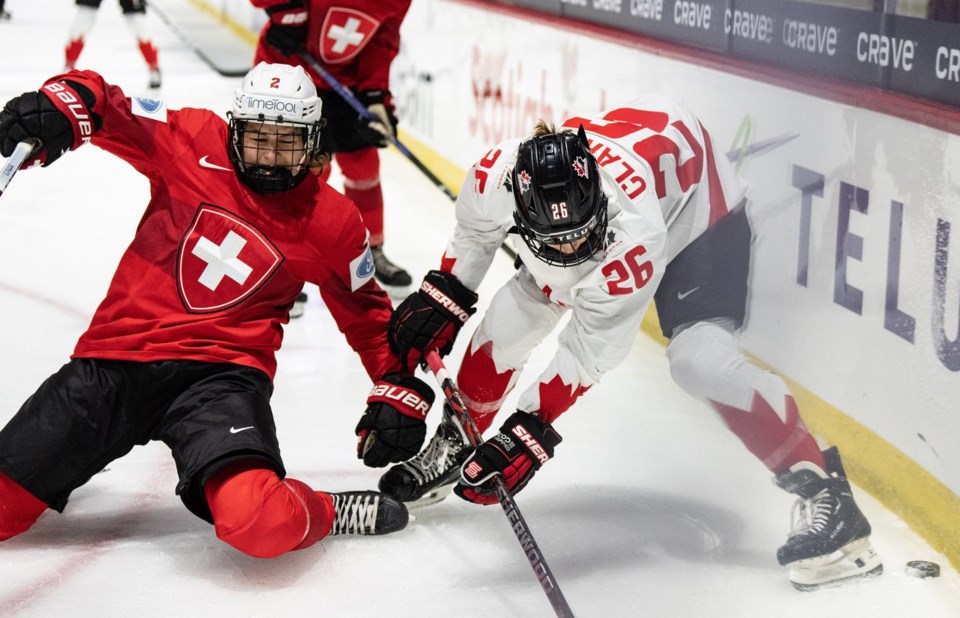CALGARY — The International Ice Hockey Federation’s decision to share tournament bonus money with women after years of men in the driver’s seat is both symbolic and practical, says the general manager of Canada’s women’s team.
"It's very significant," said Hockey Canada women's general manager Gina Kingsbury. "For years, these types of topics have been brought up to the IIHF and they've always been shut down.
"More money invested in the women's game is really important."
The IIHF stated in a website report during its annual congress that "development support," worth nearly $9 million Swiss francs (C$15 million) in 2025, will be distributed to member federations based on their countries' performances across the men's and women's world championships, the men's under-20 championship and the men's and women's under-18 championships.
"Furthermore, the support will be weighted according to IIHF World Ranking," the IIHF stated.
The IIHF's development money was previously given to federations based only on men's world championship results.
"This has been a talking point on the women's side of the game for a long time," said Canadian defender Renata Fast.
The IIHF says the money will be split with 40 per cent going to the men’s championship, 40 per cent to the women’s championship, 10 per cent to the world junior men’s tournament, and five per cent each to the men’s and women’s under-18 championships.
That equates to roughly four million Swiss francs (C$6.7 million) going to federations based on the international results of their women's teams.
"It just signals that the IIHF is realizing that they need to modernize some of the things that have just been in place for years and years and years, and recognizing the growth of the women's game and the importance of acknowledging that and valuing it," Fast said. "The prize money to me symbolizes that."
The IIHF had previously argued that development money wasn’t shared with women because the men’s world championship turns a significant profit, while the women’s tournament does not.
"Our organization wants to encourage its members to develop women’s hockey and junior programs," the IIHF said in an emailed statement.
Even though Kingsbury sits on the IIHF's women's committee and Fast on the IIHF athletes' council, the report of bonus-money redistribution was buried in a congress report and came as a surprise to them.
"It just shows that there's a shift in thinking, maybe," said Kingsbury. "If we grow the women's game and if we kind of entice countries that may not have as strong of numbers on the women's side, or as strong a team … they'll be more motivated to invest in the women's side."
The IIHF may want to motivate countries to devote equal resources to men's and women's hockey, but it's ultimately each federation's decision how to use its developmental money.
"What also would be interesting is maybe if there's a federation where the women's program is stronger than the men's program in terms of a ranking standpoint, and how now their women's team can actually bring them in some prize money in an instance where their men's programs never did, that would be huge," Fast said.
Canadian women have never finished outside the medals at either the world championship or under-18 championship. Canada took silver and the under-18 team gold in 2025.
Canada's men claimed under-18 gold, but were eliminated in the quarterfinals in both the men's and under-20 championship.
"If the women’s program is stronger than the men’s, there will be an increase in the support,” IIHF Director General Matti Nurminen said during the congress. "If the men’s and women’s programs are as strong, there will be no real impact."
Hockey Canada and USA Hockey — perennial 1-2 finishers — already have the largest women's hockey budgets in part because their female registration far outstrips other countries at a combined 200,000 players.
Nevertheless, Kingsbury says she would welcome any funding the women’s teams are able to generate through international success.
"Any increase in funds, trust me, we've got lots of projects and ideas that could grow our game and could help the women's program," she stated. "There's always more we can do."
After lopsided women’s hockey scores at the 2010 Olympic Games — and then-IOC president Jacques Rogge warning “we cannot continue without improvement” — the IIHF committed 2 million Swiss francs to international women’s hockey development.
More equitable shares in the IIHF's bonus structure 15 years later is seismic, said Kingsbury.
"Our women's committee, for many years, I remember even before I was on it, the big topic was always the trophy for the women's worlds is smaller than men's and we don't get prize money," Kingsbury said. "Both those things have changed."
This report by The Canadian Press was first published June 20, 2025.
Donna Spencer, The Canadian Press




